Dave Gorman's Blog, page 12
September 4, 2013
Passing Messages On Is Important
This is one of the trails for my new series that are currently being shown on Dave and other UKTV channels. There are four in total - well, more if you count the short and long versions - but there are four set ups. I can always tell when one's gone out because I get a few tweets from people. So far they've all been lovely and it's especially pleasing when someone's been caught out for a second and thought they were watching a real ad.
But, while I'm obviously keen to pass on the message that the series starts on Tuesday, September 17th, that's not the message I'm referring to in the title of this post.
Before we filmed these, there were various meetings in which the details were finalised. There was one script for this trail where it described the model as being "in a bikini". I always feel uncomfortable watching comics do "ironic" things that involve "totty". There has to be a really good justification for someone being a state of undress or it just looks like an old man has come up with a feeble excuse to hang around with someone youthful and nearly naked. So I said as much, and everyone agreed that a towel would be more appropriate. If anything it accentuates the difference between the glamour of the close up shot used for the "ad" and the prosaic reality you see when I've, um, "interrupted".
So the script was changed. And that's the message that should have been passed on. Because someone, somewhere had the job of casting these ads. And they had to meet various, young actresses. And they were still working from a script that involved an actress in a bikini. Because nobody had passed on the message. If you're casting someone for a gig that involves wearing a bikini, it makes sense that you have to see them in their bikini. Or their underwear. Or whatever. And so, apparently, that's what happened. With various potential-shampoo-ad-models.
I wasn't there. I've never even met the person responsible for the casting. But the women involved must be thinking he was a right old perv. Especially, Ashleigh who got the gig. Imagine doing a casting where you're asked to strip down to your skimpies, getting the gig and then discovering that it was completely unnecessary and not required for the part!
My apologies to all concerned. The casting director wasn't a perv. Or at least, if he is it's a coincidence. It's just that the message didn't get passed on.

Published on September 04, 2013 04:16
August 20, 2013
Dave On Dave Action, Coming Soon.

I'm delighted to announce that my new series, Modern Life Is Goodish, will be on the telly soon. It launches on DAVE on Tuesday, September 17th at 10pm and runs in that slot for six weeks. I hope you'll be able to tune in.
This is what the press release says:
Dave Gorman thinks modern life is good...ish. However, tired of endlessly being sold stuff he doesn't need, feeling manipulated by the media and harassed by technology, he’s become slightly obsessive about the 'ish'.
But instead of letting it drive him mad he's decided to fight back. A bit. Sort of. Ish. So he’ll be sharing his observations and venting his frustrations in six mischievous shows for Dave. Presented using his own unique blend of stand-up and documentary comedy, expect a whole new take on the things we normally take for granted.
Whether it’s idiocy on the internet, ill-thought-out technological solutions, unquestioned advertising logic, online ‘news’, one-click agreements to pages of terms and conditions, the cult of celebrity, Lord Sugar, the new Blister Pack Economy, or even (somewhat distressingly) discovering exactly where on the A-Z lists of fame he resides, Dave does what we don't: he stops and actually looks at things. And asks questions. And judging by some of the things he discovers, perhaps the people churning this stuff out ought to stop and look at what they're doing from time to time too. Because there's a hell of a lot of it that makes no sense at all.
The new series is loosely based on Dave Gorman’s internationally critically acclaimed live show, Powerpoint Presentation, which went on a three-time-extended nationwide tour of the UK including multiple London dates at the Hammersmith Apollo and the Queen Elizabeth Hall at the Southbank Centre.
Join Dave, on Dave, for a journey of intellectual curiosity and a healthy amount of humour as he holds up a mirror to the countless questionable things we’re all exposed to but just seem to accept as ok.
And that's nice.

Published on August 20, 2013 10:57
July 25, 2013
Putting A Name To The Face
I travelled into town yesterday, for the first time in a while, and this poster was all over the tube.

Now I know that the order in which the names appear on the poster is all to do with egos, star billing, and all sorts of important negotiations but every time I see a poster like this, with the cast lined up but with the wrong names floating above their heads I just think it looks like someone's done really badly in a pub quiz.
It just looks like the people responsible for marketing the film don't know which actor is which. And they're really bad at guessing. Someone should just take each of them aside and have a word. "Look, Bruce. I know you've got star billing and that means your name has to come first and all that... but because you're the star, we also want you in the middle of the poster and it's making us look a bit, y'know... stupid..."
It's obviously a composite photo - which explains why it appears with the stars in a slightly different order in other versions... like this one...

... where they've accidentally scored one out of seven by placing Mary-Louise Parker underneath her own name. In this one they also give Anthony Hopkins a completely different head. But no handcuffs.
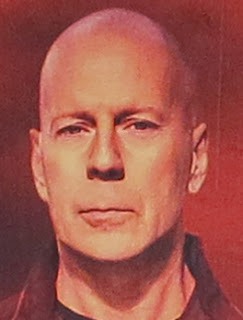
It may be something to do with the way the poster has been pasted on to the curved wall of a tube station, but the faces look pretty badly photoshopped too.
I mean, those do look like Bruce Willis's features, and it does appear to be his head... but I'm not convinced they're lined up with one another as they are in the real world.
It looks to me as if his features have been dropped in just a little too low and to the left.
Either that or he's had one of those rare Hollywood face-drops people are never going on about.
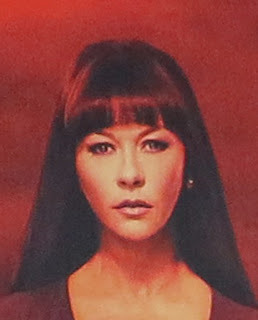
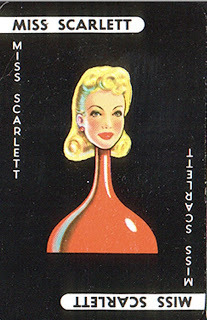
And as to Catherine Zeta Jones... well, the last time I saw a head meet a neck like that I was playing Cluedo.
So... knowing that the marketing team for Red 2 aren't averse to a bit
of shonky photoshopping, I corrected the whole poster and put the right faces
with the right names. I'm only trying to help.



Now I know that the order in which the names appear on the poster is all to do with egos, star billing, and all sorts of important negotiations but every time I see a poster like this, with the cast lined up but with the wrong names floating above their heads I just think it looks like someone's done really badly in a pub quiz.
It just looks like the people responsible for marketing the film don't know which actor is which. And they're really bad at guessing. Someone should just take each of them aside and have a word. "Look, Bruce. I know you've got star billing and that means your name has to come first and all that... but because you're the star, we also want you in the middle of the poster and it's making us look a bit, y'know... stupid..."
It's obviously a composite photo - which explains why it appears with the stars in a slightly different order in other versions... like this one...

... where they've accidentally scored one out of seven by placing Mary-Louise Parker underneath her own name. In this one they also give Anthony Hopkins a completely different head. But no handcuffs.

It may be something to do with the way the poster has been pasted on to the curved wall of a tube station, but the faces look pretty badly photoshopped too.
I mean, those do look like Bruce Willis's features, and it does appear to be his head... but I'm not convinced they're lined up with one another as they are in the real world.
It looks to me as if his features have been dropped in just a little too low and to the left.
Either that or he's had one of those rare Hollywood face-drops people are never going on about.


And as to Catherine Zeta Jones... well, the last time I saw a head meet a neck like that I was playing Cluedo.
So... knowing that the marketing team for Red 2 aren't averse to a bit
of shonky photoshopping, I corrected the whole poster and put the right faces
with the right names. I'm only trying to help.


Published on July 25, 2013 06:12
July 8, 2013
Angela Lansbury Forever
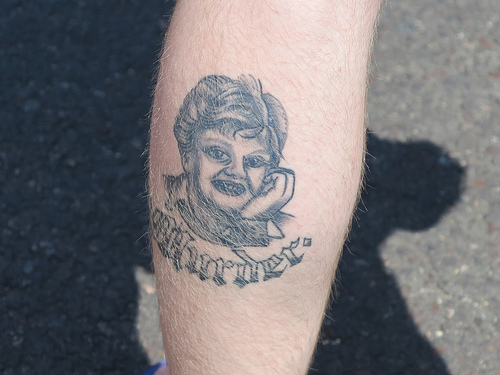
Murder She Wrote Tattoo, originally uploaded by Dave Gorman.
On Saturday morning I saw this tattoo on a man's leg.
I have a regrettable tattoo on my left arm. I used to feel haunted by it. Nowadays I rarely give it much thought. But on Saturday morning I spent a few moments thinking, "it could be worse... I could have a tattoo of Angela Lansbury from Murder She Wrote on my leg."

Published on July 08, 2013 00:30
June 14, 2013
Faintly Ridiculous
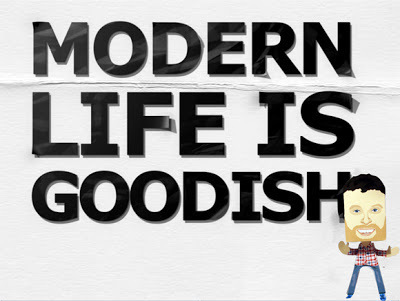
Blimey. Well the last recording for the series turned out to be a bit eventful.
The series is six episodes. Each episode is an hour long. That's a TV hour - so it's a little less when you make way for some commercials and so on but even so, that's like putting six different Edinburgh shows together.
In the late 90s, when I was first wrestling with the concept of one-man-shows and particularly with how to make one feel like a show and not just a collection of bits and pieces, I wouldn't have believed it possible to work on six of them concurrently. But weirdly, in the time that's passed, I've got better at doing that, than I am at doing short sets. These days, writing an hour is sort of easier than writing ten or twenty minutes for me. A short set seems unsatisfying because you can't weave stuff back in. It can't really be as cohesive.
With this series we've filmed two episodes in a night. We don't do that just because it's cheaper - although that definitely helps - it's also because it suits the way we want to make the show. And I enjoy the energy of performing. I prefer doing it that way.
TV-people normally like to record loads of material and then edit it down - the idea being that, that way, they get only the very best stuff. But it ignores the fact that, in a show, all the stuff is connected. It isn't a series of discrete, individual elements that can be assembled in any order and with any cuts you like. A particular sentence might have got the biggest laugh of the night... but if you take away the four sentences that preceded it and the one five minutes earlier that planted a fact in the audience's mind that's come back to hang around in the shadows of the later joke... then it just won't be as funny. And the laugh it got on the night will sound odd on the TV because the live audience wasn't just laughing at those words... but at those-words-in-that-particular-context.
I don't like the idea that the recording is where you create all the different elements but that the edit suite is where you build the show. So we set out to build the show first. Which is why I did a lot of dry runs of the show live in advance of the recordings. And I'm very grateful to the venues and audiences in Windsor, Fareham and Tring for making that possible. Doing the show, then changing it, then doing it again and then changing it and then doing it again and then... - you get the idea - means you find out so much more about the material than you ever will do by having a meeting.
And, if we got it right, it meant we'd be able to make shows that flow in the same way that live shows do. We could record about an hour in a way that had a beginning, a middle and an end and nobody would ever have to say, "can you rephrase that bit because it won't make sense if we have to cut the first part". Because we knew weren't going to cut the first part. Or any part. Because we'd already made sure that things worked and fitted together in the right kind of time.
But a consequence of that is that there isn't much slack in the system. We don't have a lot of spare time for any retakes... so if something goes wrong, we're up against it. And on Tuesday - our final recording - things wanted to go wrong.
For some reason the projection started to flicker and black out on Tuesday. It started during the first show and then appeared to be fixed. Then I started to flicker and black out too. Literally. There's at least one Found Poem in each show. They're silly moments of cod-seriousness and I tend to end them with an over the top bow and a silly, theatrical flourish. At the end of the first Found Poem on Tuesday as I took that silly bow my vision blacked out. It sounded like I was in an echo chamber and I felt my knees buckle. I tried to stand up and carry on, my vision didn't return and I felt as though my speech was slurred. So I had no choice but to stop and tell people I'd nearly fainted. Which is, I think, what had happened.
Producers came to see me as my eyes and ears adjusted. They offered me a break. But I didn't want to take one. And I didn't really want the audience to know how bad I was feeling. Because an audience wants to relax. An audience wants to trust that a performer is in control and that everything's going to be okay. It's harder to laugh if, at the back of your mind, there's a worry that the guy doing the talking might fall over. It adds a new context to things. It isn't helpful. On top of that, a big break could run the risk of disconnecting the material that has to be connected.
And besides, we don't actually have that much spare time in our schedule. So we carried on. Yesterday I saw some footage from the show. I was expecting to see an ashen-faced, hollow-eyed figure saying the words. But I looked alive. And the audience were completely switched on.
In the break between the two shows there was panic in the eyes of the production team. Water was drunk. Bananas were eaten. I hadn't had any dinner that day so a cheese sandwich was provided. But the bite I took came straight back up.
"Sit with your head between your knees." "Lie down with your feet in the air." "Drink more water." "It's very hot in here, let's take him outside for some fresh air." "Do you think you're going to throw up?"
That's kind of how the interval went. The second show started fine. But then, less than ten minutes in, the projector failed again. On tour I take my own kit. I know what the back up plans are and I've never had to cancel a show because of a failed projector or laptop. I'm very belt and braces about these things - it's what I do for a living after all. But for the series we've hired in a different projector. It's still my laptop and I've still made all of the stuff that's on it (and yes, it's still made in Powerpoint) but the projector and the screen are hired in because there are issues with projection on TV that you don't have to contend with live. Hotspots. Colour correction. Etc etc.
People started rushing around behind the scenes, changing cables, trying to work out why the signal wasn't getting through properly. The clock was ticking. I was trying to keep the audience ticking as well. As was the brilliant, Tom Price who's done warm-up for the whole series. He's bloody ace, Tom. If you get the chance to see him, take it. I left the stage - ostensibly to help with the technical side of things. In reality I was going to the toilet and, um, throwing up a little bit. And then going outside and sitting in the fresh air with my head between my knees. I don't mind the audience knowing that the projector's sick... but I don't want them to know about me and I don't want them to think I'm sulking while the fix happens. So when I feel a bit less woozy I go back into the venue and join in a bit with Tom.
Word reaches me that they don't know what the problem is and can't guarantee that it won't happen again. They have a back up projector, but that hasn't fixed it. They have different cabling... but that hasn't fixed it either. They want me to just go on with the show and say that they can fix any problems in the edit. But of course they can't fix the live audience's night out in the edit. If the projection fails again, the audience won't be seeing all the information they need to understand the material. We can't exactly ask an audience to pretend they're getting a joke they're not getting. How would they know what to pretend? So I explain to the audience that if the projection flickers and wobbles we'll all just ignore it and get on with it. They'll still see the information and get the material and the TV audience won't have to know it happened. But if they wince and react to it flickering it will definitely look odd. And I promise that if it cuts out completely we'll stop and do what we can.
I was worried that the audience would have lost all their momentum. I was worried that it would be like someone had pressed the reset button and that we'd be going from a standing start, with all the little details that had been dropped in earlier now forgotten. I think a lot of TV audiences are made to feel like they're a prop for
the show. Maybe they go to see a sitcom recorded and they expect it to be like
watching a funny play performed. But then they discover they're watching the same scene recorded eight times and there are long breaks between scenes and what they thought might last an hour actually lasts two. Or three. Or four. When there's a twenty minute delay in filming under those
circumstances, the audience grows impatient. If they think the delay
is down to a fussy director, a prima donna performer or just some TV
bullshit they weren't expecting they feel imposed upon. But I think the audience on Tuesday could see that this delay was caused by people trying to fix their evening. Whatever the reason, they
didn't seem in the least bit resentful. Rather than resenting anything, it felt as though we had all bonded in a feeling that, while outside forces were trying to ruin our fun, we weren't bloody well going to let it happen.
We carried on. And somehow the projector didn't fail, blink or flicker once. I don't think the audience realised how sick I was. And fifteen minutes later, I didn't feel sick at all any more. And no momentum was lost. They remained switched on to every nuance and every call-back. In fact, they started finding material that wasn't there because a couple of moments became call-backs either to the delay or to the first show. I had to say a couple of things twice in order to not have some weird out of context laughter in the mix that would make the TV audience feel like they'd missed an in-joke. Which of course they had. They were, quite simply, an amazing audience. I'm very, very grateful.
For the first time the recording overran. By ten minutes. There really isn't much slack in the system. It's better that way.

Published on June 14, 2013 04:54
May 31, 2013
Life Is Good.

I'm bloomin' loving making Modern Life Is Goodish. The pace of the work is relentless (there were a couple of days last week when I had to work through the night in order to have things ready on time) but the end result has, so far, more than justified the means.
And, actually, I sort of enjoy working like that. Sort of.
One of the reasons the pace is so intense is that we record two shows in a night. We can do that because we're not following the usual TV practice of over-recording. We make two hour-long shows by filming for, um, about an hour. Twice. It's far more fun that way because the live audience gets to see a show, rather than feeling like props at the recording of some stuff that will one day be a show.
It also means that the series is nearly done and dusted. Two thirds of it is in the can, or at least, on a hard drive, already. We've just got one pair of shows to go.
I'll be fine tuning the material at the Court Theatre in Tring next week - June 5, 6 and 10 - come along if you fancy it - and then the final recording is at the show's glorious home, The Tabernacle (above) on June 11th.

Published on May 31, 2013 05:36
May 17, 2013
Windsor, Windsor, Windsor, Tring, Tring, Tring.
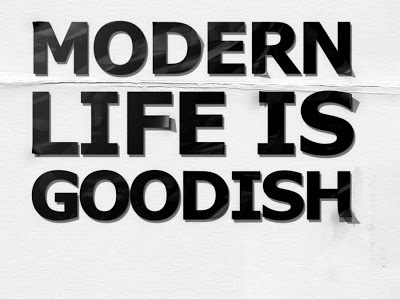
I can't really explain how much I enjoyed the last week. It's the kind of work that really excites me.
I'm working on Modern Life Is Goodish - a new series for the lovely folks at Dave. The thing with telly-people is that they're normally control freaks. They want to know exactly what's going to happen and exactly what's going to be said... and I don't enjoy working like that.
I've never really written a script for any of my stage shows. There's never been any words typed out and I've never learned the words. When we made the DVD of Googlewhack, people - and by people, I mean lawyers - insisted on their being a script. At first they didn't believe me that there wasn't one. Eventually we solved the problem by pointing a video camera at the show one night and having some poor sod transcribe it. The transcript was full of errors, but they didn't seem to mind that. They had a script. It might have been wrong... but it existed and that's all they needed to enable them to do whatever they had to do.
I find performing to an audience far more helpful than sitting, staring at a blank screen. The phrase that comes to mind when you're trying to write isn't necessarily the same phrase that comes to mind when you're talking to an audience. And often the phrase that comes out in front of an audience is better than the one you would have written.
And that's what's lovely about working on this show. Nobody's insisting on endless meetings where we discuss the minutiae - they're allowing me to work the material up live, which is the way my head works best. I find that if I perform some material a few times I refine the content without really stopping to think about it. The good words start to stick in place and the not so good words get replaced slowly and it all coalesces. In a meeting you'd only be guessing - but on stage you know for sure.
So, on Thursday and Friday night last week I performed shows at the Firestation in Windsor. I thought about it over the weekend. Performed it again on Monday night in Fareham and then on Tuesday night we taped it at the Tabernacle in Notting Hill. That's a six day bootcamp for the shows (I'm doing two shows each night - both of which will become an hour of TV) and it's both more fun and more productive than any amount of meetings. Exhausting. But very, very satisfying.
And now my job is to forget that material and move straight on to the next shows. So I'll repeat the pattern on May 23, 24 and 27th - but all of those will be at The Firestation Arts Centre in Windsor - before the next taping on the 28th and then again on June 5th, 6th and 10th at The Court Theatre, Tring before the final taping on the 11th.
I think the remaining Windsor shows are close to selling out although there are still a handful of tickets for those. And there are more available in Tring.

Published on May 17, 2013 10:08
April 29, 2013
Tuesday Night
So... on my last post I said we were looking for an audience for Tuesday (tomorrow) night. I've not been in the office that much since then (as well as writing these shows I'm involved in the small matter of moving house - timing's always been one of my strengths) so I've been a bit unaware of things but I'm told there's been a far greater response than anyone was expecting.
Which is flattering. Obviously.
But also means that more people have asked to come along than we can accomodate. Some of you will have had emails saying that you're guaranteed entry - and if you turn up on time, you will be.
Others have been told that they'll be let in on a first come, first served basis.
This is one of the problems with free events. No matter what you do, some people will always say they want to come and then decide not to because, hell, it's free so they've nothing to lose. Experience shows that if we only say yes to 200 people we end up with an audience of 50 and a lot of empty seats.
But here's the thing... we want you to come along. We want it to be a fun night. And the people in charge have done their best to get the numbers so that - if the average number of no-shows happens - all will be well.
Luckily, with the series just around the corner - we have a way of rewarding anyone we do unfortunately have to turn away. We'll offer you guaranteed entry to one of the recordings instead.
Which is flattering. Obviously.
But also means that more people have asked to come along than we can accomodate. Some of you will have had emails saying that you're guaranteed entry - and if you turn up on time, you will be.
Others have been told that they'll be let in on a first come, first served basis.
This is one of the problems with free events. No matter what you do, some people will always say they want to come and then decide not to because, hell, it's free so they've nothing to lose. Experience shows that if we only say yes to 200 people we end up with an audience of 50 and a lot of empty seats.
But here's the thing... we want you to come along. We want it to be a fun night. And the people in charge have done their best to get the numbers so that - if the average number of no-shows happens - all will be well.
Luckily, with the series just around the corner - we have a way of rewarding anyone we do unfortunately have to turn away. We'll offer you guaranteed entry to one of the recordings instead.

Published on April 29, 2013 05:37
April 24, 2013
Goodish Audience Wanted - This Tuesday
 Y'know that telly thing I mentioned recently? It's called Modern Life Is Goodish and I'm making it for the lovely people at Dave. Well we want to test out some of the technical aspects of it. We want to see that the set, lights, sound and, um, all-that-stuff works and that things flow the way we think they will.
Y'know that telly thing I mentioned recently? It's called Modern Life Is Goodish and I'm making it for the lovely people at Dave. Well we want to test out some of the technical aspects of it. We want to see that the set, lights, sound and, um, all-that-stuff works and that things flow the way we think they will.That way we can tweak things before we get to the actual recordings when it'd be a bit late. So we're going to do a test show next Tuesday. April 30th. And it wouldn't be much of a test if we didn't have an audience. And you - yes you - are exactly the kind of person we'd like to be there. You and a couple of hundred others.
The venue is The Tabernacle, Powis Square, London W11. The doors will open at 6pm. There'll almost certainly be a drink of some kind. And it's free. There'll be a fair old chunk of a show and I'll do a Q&A... basically it should be a fun night out.
If you fancy it you can email us and let us know you'd like to come. We've set up a special email address for it: davegorman at avalonuk dot com. I reckon you can work that out. Don't worry - it's not my actual email address, so it won't be me who's trying to coordinate the whole thing. That would spell disaster.
Anyway. See you there, yeah? Yeah? Yeah. Great.

Published on April 24, 2013 03:47
April 12, 2013
When Did We Get So Griefy?
BBC2 is currently part way through a documentary series called Keeping Britain Alive: A Day In The NHS. I haven't seen it but I have seen the trailers. The whole series was filmed in one day with 100 camera crews trying to capture the enormity of what happens in the National Health Service which is, apparently, this nation's biggest institution. In the trails for it, we are told that on any given day 1,300 of us die and 2,000 of us are born.
One thousand, three hundred of us. Daily. That's a lot of dying. For each and every one of those 1,300 deaths someone, somewhere mourns. Or at least I (sort of) hope they do... because to contemplate someone passing away leaving nobody to feel their loss seems bleaker and sadder still.
When someone you love passes it goes without saying that the sadness is deep. And it is deeply individual too. But every day we hear about the deaths of strangers and in comparison it barely registers. Of course it can stir some emotions - but none of us is able to pretend that it compares to the death of a loved one. At times we all read news stories that involve the death of a stranger, tut, feel perhaps a blip of sadness and then turn the page. It doesn't make us unfeeling animals, it makes us human. Grief is not the normal response to the death of a stranger... if it were, we would all be in a permanent state of grief and then none of us would get on with living for all the death that surrounds us. Of course we empathise with those who have lost loved ones, but that's not the same thing. We sometimes raise a glass to those whose lives touched ours from afar. And we contemplate our own mortality when it turns out the pop stars we sang along to in our youth don't actually live forever. But we also turn the page and get on with things.
This is a recent story from one of our red top tabloids:
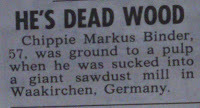
It's not just the opening paragraph... it's the whole story, as reported, in its entirety. What a way to talk about a man's death! What a way to talk about a man's life. Fifty seven years and he gets one cor-blimey-would-you-believe-it! sentence.
What are we supposed to think when we read this story? What, if anything, are we being invited to feel? Sadness? I don't think that's the writer's intention. Amazement? Maybe.
How many people do you think read this? How many of them do you think have given Herr Binder a second thought since?
But it seems that when a celebrity passes, the rules are different. Because we know who they are we feel they are not strangers. But they are. Aren't they? We seem to have become, well, something of a griefy bunch.
Not long after Whitney Houston died I was taken to task by a stranger on Twitter for the insensitive way in which I'd responded to that sad news. Which was odd to me because I hadn't mentioned her passing at all. Not on twitter. Nor anywhere else for that matter. When I read the news, I registered my surprise to a friend and then - rightly, I think - regarded it as nothing-to-do-with-me.
And that was what had upset him. It was, he thought, disrespectful of me to not tweet an RIP message. Things have come to a pretty pass when the absence of mourning is considered an insult.
I don't know when we became so griefy as a nation. (Nor do I know if it is confined to these shores). Is it trite to call it a symptom of our Post-Diana world? It probably is. But that was certainly a time when the failure-to-mourn was seen by some to be an active sign of rebellion rather than, y'know, normal. I think it's connected.
But I think things have been magnified by the growth of the internet in general and of Twitter in particular. In a world where everyone can express every nano-thought in an instant, some people do just that. Because they can. Because it's there. It might be a good reason for climbing Mount Everest but it's a lousy one for tweeting what you had for breakfast.
When Stephen Gately died there was a Twitter campaign to get one of Boyzone's singles to number one "in his honour". I suspect that was in part fuelled by the anger stirred up by Jan Moir's Daily Mail opinion piece on his passing. As insensitive a piece of writing as I can recall. The article had angered me but I couldn't begin to understand the campaign. I was asked to retweet a "let's all buy his single" message and when I didn't do so, one person told me that my failure to get on board meant I was insulting his memory. I wasn't. I just didn't want to own a Boyzone single. That's not an insult to Stephen Gately. More to the point, it's not an insult to his memory.
I am unable to feel true, deep sadness about someone's death unless it is someone I know. Does that make me a bad man? I don't think so. When musicians I admire die, they live on in my record collection. I do not lose them. Their children lose a parent, their parents lose a child and their partners lose a lover and my feelings are only for those people. It seems selfish to me to think otherwise. But if you feel differently - if your connection to a performer feels stronger than that and you feel a deeper sadness, then that's fine by me. But please don't make the assumption that we must all feel the same emotion to the same degree and that anyone not doing so is being rude. That's not fair.
For what it's worth, I can't celebrate a death either. And it probably hasn't escaped your attention that this blog is appearing at a time when many appear to be doing just that. I'm as non-plussed by that as I am by those who want us all to grieve. It's nothing to do with me. But then, in truth, it's nothing to do with most of us and that hasn't stopped people weighing in on both sides.
I suspect it would have happened to some degree no matter what. But I wonder if it would have had the same focus? Some of it feels more reactive than that. Some of it feels like people cocking a snook at those who assumed the whole nation would be plunged into mourning. A sort of, "well, if you're going to demand our reverence, we'll show you just how irreverent we can be", stance. And the louder one side screams that we should all be sad, the louder the others will scream that they're happy. And vice versa.
The magnitude of one's achievements does not, for me, magnify the sadness of one's death. What it magnifies is the font used to report it and the number of column inches given over to it. Most of us will get nothing. Markus Binder got one not particularly reverent sentence. Others get pages 1-14 of every newspaper and "souvenir" pull out sections to boot. That doesn't make their passing sadder. Not really. Not for those of us who didn't know them. Not for me, anyway. It just makes it louder. Bigger. More. And if you amplify the response - you amplify all of it.
One thousand, three hundred of us. Daily. That's a lot of dying. For each and every one of those 1,300 deaths someone, somewhere mourns. Or at least I (sort of) hope they do... because to contemplate someone passing away leaving nobody to feel their loss seems bleaker and sadder still.
When someone you love passes it goes without saying that the sadness is deep. And it is deeply individual too. But every day we hear about the deaths of strangers and in comparison it barely registers. Of course it can stir some emotions - but none of us is able to pretend that it compares to the death of a loved one. At times we all read news stories that involve the death of a stranger, tut, feel perhaps a blip of sadness and then turn the page. It doesn't make us unfeeling animals, it makes us human. Grief is not the normal response to the death of a stranger... if it were, we would all be in a permanent state of grief and then none of us would get on with living for all the death that surrounds us. Of course we empathise with those who have lost loved ones, but that's not the same thing. We sometimes raise a glass to those whose lives touched ours from afar. And we contemplate our own mortality when it turns out the pop stars we sang along to in our youth don't actually live forever. But we also turn the page and get on with things.
This is a recent story from one of our red top tabloids:

It's not just the opening paragraph... it's the whole story, as reported, in its entirety. What a way to talk about a man's death! What a way to talk about a man's life. Fifty seven years and he gets one cor-blimey-would-you-believe-it! sentence.
What are we supposed to think when we read this story? What, if anything, are we being invited to feel? Sadness? I don't think that's the writer's intention. Amazement? Maybe.
How many people do you think read this? How many of them do you think have given Herr Binder a second thought since?
But it seems that when a celebrity passes, the rules are different. Because we know who they are we feel they are not strangers. But they are. Aren't they? We seem to have become, well, something of a griefy bunch.
Not long after Whitney Houston died I was taken to task by a stranger on Twitter for the insensitive way in which I'd responded to that sad news. Which was odd to me because I hadn't mentioned her passing at all. Not on twitter. Nor anywhere else for that matter. When I read the news, I registered my surprise to a friend and then - rightly, I think - regarded it as nothing-to-do-with-me.
And that was what had upset him. It was, he thought, disrespectful of me to not tweet an RIP message. Things have come to a pretty pass when the absence of mourning is considered an insult.
I don't know when we became so griefy as a nation. (Nor do I know if it is confined to these shores). Is it trite to call it a symptom of our Post-Diana world? It probably is. But that was certainly a time when the failure-to-mourn was seen by some to be an active sign of rebellion rather than, y'know, normal. I think it's connected.
But I think things have been magnified by the growth of the internet in general and of Twitter in particular. In a world where everyone can express every nano-thought in an instant, some people do just that. Because they can. Because it's there. It might be a good reason for climbing Mount Everest but it's a lousy one for tweeting what you had for breakfast.
When Stephen Gately died there was a Twitter campaign to get one of Boyzone's singles to number one "in his honour". I suspect that was in part fuelled by the anger stirred up by Jan Moir's Daily Mail opinion piece on his passing. As insensitive a piece of writing as I can recall. The article had angered me but I couldn't begin to understand the campaign. I was asked to retweet a "let's all buy his single" message and when I didn't do so, one person told me that my failure to get on board meant I was insulting his memory. I wasn't. I just didn't want to own a Boyzone single. That's not an insult to Stephen Gately. More to the point, it's not an insult to his memory.
I am unable to feel true, deep sadness about someone's death unless it is someone I know. Does that make me a bad man? I don't think so. When musicians I admire die, they live on in my record collection. I do not lose them. Their children lose a parent, their parents lose a child and their partners lose a lover and my feelings are only for those people. It seems selfish to me to think otherwise. But if you feel differently - if your connection to a performer feels stronger than that and you feel a deeper sadness, then that's fine by me. But please don't make the assumption that we must all feel the same emotion to the same degree and that anyone not doing so is being rude. That's not fair.
For what it's worth, I can't celebrate a death either. And it probably hasn't escaped your attention that this blog is appearing at a time when many appear to be doing just that. I'm as non-plussed by that as I am by those who want us all to grieve. It's nothing to do with me. But then, in truth, it's nothing to do with most of us and that hasn't stopped people weighing in on both sides.
I suspect it would have happened to some degree no matter what. But I wonder if it would have had the same focus? Some of it feels more reactive than that. Some of it feels like people cocking a snook at those who assumed the whole nation would be plunged into mourning. A sort of, "well, if you're going to demand our reverence, we'll show you just how irreverent we can be", stance. And the louder one side screams that we should all be sad, the louder the others will scream that they're happy. And vice versa.
The magnitude of one's achievements does not, for me, magnify the sadness of one's death. What it magnifies is the font used to report it and the number of column inches given over to it. Most of us will get nothing. Markus Binder got one not particularly reverent sentence. Others get pages 1-14 of every newspaper and "souvenir" pull out sections to boot. That doesn't make their passing sadder. Not really. Not for those of us who didn't know them. Not for me, anyway. It just makes it louder. Bigger. More. And if you amplify the response - you amplify all of it.

Published on April 12, 2013 13:13
Dave Gorman's Blog
- Dave Gorman's profile
- 202 followers
Dave Gorman isn't a Goodreads Author
(yet),
but they
do have a blog,
so here are some recent posts imported from
their feed.



